[su_note note_color=”#f4f4f4″ text_color=”#000000″ radius=”3″ class=”” id=””]
[su_custom_gallery source=”media:3994″ limit=”20″ link=”none” target=”self” width=”140″ height=”140″ title=”never” class=””]
CDC has been collaborating with global public health and industry partners to learn about Omicron, as we continue to monitor its course. We are still learning about how easily it spreads, the severity of illness it causes, and how well available vaccines and medications work against it.
Spread
The Omicron variant spreads more easily than the original virus that causes COVID-19 and the Delta variant. CDC expects that anyone with Omicron infection can spread the virus to others, even if they are vaccinated or don’t have symptoms.
Symptoms
Persons infected with the Omicron variant can present with symptoms similar to previous variants. The presence and severity of symptoms can be affected by COVID-19 vaccination status, the presence of other health conditions, age, and history of prior infection.
Severe Illness
Omicron infection generally causes less severe disease than infection with prior variants. Preliminary data suggest that Omicron may cause more mild disease, although some people may still have severe disease, need hospitalization, and could die from the infection with this variant. Even if only a small percentage of people with Omicron infection need hospitalization, the large volume of cases could overwhelm the healthcare system which is why it’s important to take steps to protect yourself.
Vaccines
COVID-19 vaccines remain the best public health measure to protect people from COVID-19 and reduce the likelihood of new variants emerging. This includes primary series, booster shots and additional doses for those who need them.
Scientists are still learning how effective COVID-19 vahttps://cdc.gov/coronavirus/2019-ncov/vaccines/stay-up-to-date.htmlccines are at preventing infection from Omicron. Current vaccines are expected to protect against severe illness, hospitalizations, and deaths due to infection with the Omicron variant. However, breakthrough infections in people who are vaccinated are likely to occur. People who are up to date with their COVID-19 vaccines and get COVID-19 are less likely to develop serious illness than those who are unvaccinated and get COVID-19.
Treatments
Scientists are working to determine how well existing treatments for COVID-19 work. Some, but not all, monoclonal antibody treatments remain effective against Omicron. Public health agencies work with healthcare providers to ensure that effective treatments are used appropriately to treat patients.
Source: www.cdc.gov
[/su_note]
[su_image_carousel source=”media:3994″ limit=”20″ slides_style=”default” controls_style=”dark” crop=”4:3″ columns=”1″ adaptive=”yes” spacing=”yes” align=”none” max_width=”none” captions=”no” arrows=”yes” dots=”no” link=”none” target=”blank” autoplay=”5″ speed=”medium” image_size=”large” outline=”yes” random=”no” class=””]

